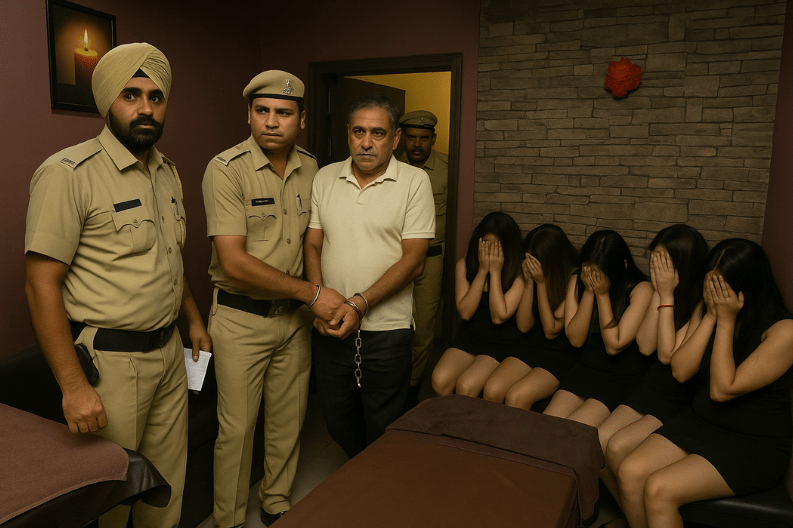The Police break up prostitution racket in Delhi after uncovering an illegal operation disguised as a spa on Tank Road, Karol Bagh. The raid took place on Sunday and resulted in the arrest of two men. Police also rescued eight women trapped inside the spa. The Delhi Police began their investigation on October 1 after receiving a tip about suspicious activity.
To gather proof, an Anti-Narcotics Cell officer went undercover as a customer. When he asked for massage services, the staff offered a choice of eight women and demanded an extra Rs 3,000 for prostitution. After confirming the illegal offer, the officer alerted his team. Police officers immediately rushed in and raided the premises.
They arrested Ishwar Dass, a 69-year-old manager from Rani Bagh, and Sikendra Thakur, aged 42, from Pandav Nagar. Both men admitted to running the racket for almost two years to make money. Officers rescued eight women and seized key items, including a customer register, two condoms, and Rs 4,500 in marked currency from the undercover officer.
Authorities booked the men under Sections 3, 4, and 5 of the Immoral Traffic (Prevention) Act, which punishes trafficking and prostitution. The law aims to protect women from exploitation and penalize those who profit from illegal acts.
Deputy Commissioner of Police Nidhin Valsan said the investigation team is tracking others linked to the racket. He added that both accused have ties to other illegal businesses. The police are checking if the spa was part of a larger network trafficking women across Delhi and nearby states.
This case highlights the growing issue of human trafficking and sexual exploitation in India. According to the National Crime Records Bureau (NCRB), the country reported over 8,000 trafficking cases in 2021. Many victims come from poor families and are tricked with fake job offers before being forced into prostitution.
Experts say the problem is not limited to metro cities. States such as Punjab and nearby Chandigarh have also seen a rise in organized sex rackets. These groups often use legal businesses like spas, salons, and massage centers as cover for illegal activities.
Police departments across India are stepping up their fight against trafficking. They work with NGOs and women’s welfare groups to rescue victims and help them recover. Authorities also encourage citizens to stay alert, report suspicious behavior, and support awareness drives.
Public involvement plays a key role in preventing such crimes. When people recognize signs of trafficking, they help police act faster. Awareness campaigns, school education, and social media can teach citizens how to identify and report trafficking cases.
Human trafficking leaves deep emotional and physical scars. Many rescued women need long-term care, counseling, and skill training to rebuild their lives. Government and social organizations continue to push for stronger protection and rehabilitation programs.
However, as the investigation continues, the Delhi Police are determined to uncover every part of the network behind this racket. The Police break up prostitution racket case highlights the urgent need for public vigilance, stronger enforcement, and community support to end exploitation and protect vulnerable women.



